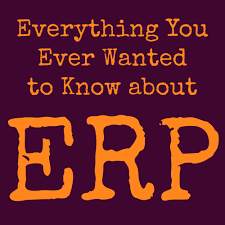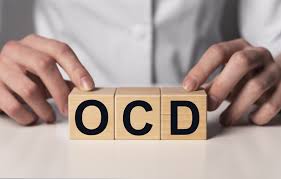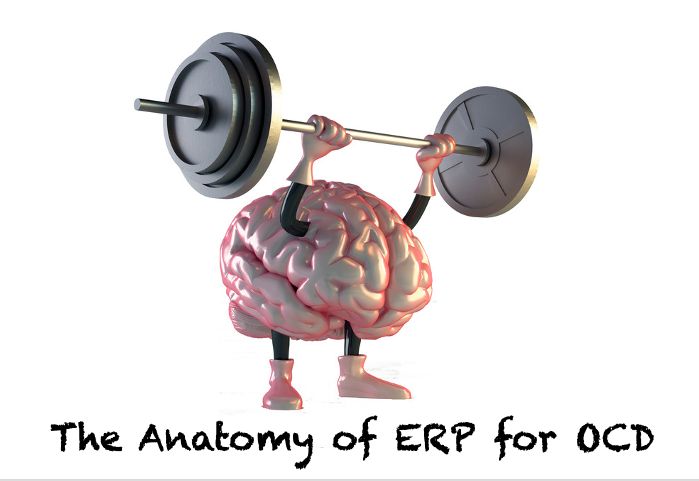If you are one of the millions of people who suffer from OCD, you know how difficult it can be to manage your symptoms. There is no one-size-fits-all approach to treating OCD, but ERP therapy has been shown to be one of the most effective methods. In this comprehensive guide, we will discuss what ERP therapy is, how it works, and the benefits it can provide for those with OCD.
Contents
What Is ERP Therapy?
 ERP stands for exposure and response prevention. It is an evidence-based psychological treatment for OCD that involves gradually exposing oneself to the things one fears. And, at the same time, learning to refrain from the compulsive behaviors that one uses to reduce anxiety.
ERP stands for exposure and response prevention. It is an evidence-based psychological treatment for OCD that involves gradually exposing oneself to the things one fears. And, at the same time, learning to refrain from the compulsive behaviors that one uses to reduce anxiety.
ERP is considered the gold standard of psychological treatment for OCD. And, it has been found to be effective in reducing OCD symptoms in 70-80% of cases.
The therapy starts with exposure exercises. The therapist and patient work together to develop a list of activities that trigger the patient’s OCD symptoms. The patient is then asked to practice these activities in real life, without engaging in their usual compulsions.
Exposure therapy can be difficult and anxiety-provoking. But, it is important to remember that the goal is not to eliminate all anxiety. The goal is to help the patient learn to tolerate anxiety and uncertainty without resorting to their compulsions. in fact, it is often only by facing their fears that patients with OCD can learn to control their symptoms.
How Does ERP Therapy For OCD Works?
OCD is a type of anxiety disorder that causes sufferers to have intrusive, unwanted thoughts (obsessions) and/or engage in repetitive behaviors (compulsions). These obsessions and compulsions can interfere with daily life, making it difficult to work, go to school, or even leave the house.
ERP therapy is a type of therapy that helps people manage their OCD by slowly exposing them to their triggers. And teaching them healthy coping mechanisms. The goal of ERP is not to eliminate obsessions or compulsions altogether. But to help the person learn how to control them.
During ERP therapy, the therapist will work with the client to identify their specific triggers and create a hierarchy of fear. The therapist will then help the client slowly and expose them to their triggers. Starting with the least feared trigger and working up to the most feared trigger.
ERP therapy can be done in individual or group settings. And usually lasts for 12-16 weeks. The number of sessions will depend on the severity of the OCD symptoms.
An Example of ERP Therapy For OCD
How ERP therapy for OCD works is a common question I get asked. Here is an example of how this type of therapy can help someone with OCD.
John has OCD and his main trigger is germs. He obsesses over the fear of contracting a disease from others. To cope with this, he engages in compulsive behaviors such as washing his hands excessively, avoiding touching doorknobs, and carrying hand sanitizer with him at all times.
During ERP therapy, John would work with a therapist to gradually expose himself to situations that trigger his OCD. This could include things like touching a door handle or shaking someone’s hand. And, initially, he would do this with the therapist’s help.
As John becomes more comfortable with these exposures, he would start to do them on his own. And, eventually, he would be able to do them without any anxiety or fear.
The above is just one example of how ERP therapy can help people with OCD. If you or someone you know is struggling with OCD, please seek professional help. ERP therapy is an effective treatment for OCD and can help people lead normal, productive lives.
What Are The Benefits Of ERP Therapy For OCD?
 There are many benefits of ERP therapy for OCD sufferers. This type of therapy has been shown to be an effective treatment for OCD. In a study published in The American Journal of Psychiatry, patients who underwent ERP therapy showed a significant reduction in OCD symptoms. Additionally, ERP therapy has been shown to be an effective treatment for other mental disorders such as anxiety and depression.
There are many benefits of ERP therapy for OCD sufferers. This type of therapy has been shown to be an effective treatment for OCD. In a study published in The American Journal of Psychiatry, patients who underwent ERP therapy showed a significant reduction in OCD symptoms. Additionally, ERP therapy has been shown to be an effective treatment for other mental disorders such as anxiety and depression.
Some of the benefits associated with ERP therapy are;
- Reduced OCD symptoms
- Improved quality of life
- Decreased anxiety and depression symptoms
- Increased sense of control over thoughts and actions
If you or someone you know is struggling with OCD, consider seeking out ERP therapy. This type of therapy can provide lasting relief from the symptoms of OCD. For more information about ERP therapy, please contact a mental health professional.
Moreover, the major benefit of considering ERP therapy is – that it hardly has any side effects! So, people consider this to be a natural and healthy method to treat OCD.
How CBT And ERP Are Different?
CBT is cognitive-behavioral therapy. It is a type of therapy that helps you change the way you think about things. This can help you change the way you behave. ERP is exposure and response prevention. This is a type of therapy that helps you face your fears and learn how to control your reactions to them.
It is believed to have differences in the areas they address. CBT is said to be more effective in treating anxiety disorders while ERP is said to treat OCD more effectively.
CBT and ERP are two different types of therapies that can be used to treat OCD. They both have their own strengths and weaknesses, so it’s important to figure out which one will work best for you. Some of the key differences between the two;
- CBT focuses on changing the way you think about things, While ERP helps you face your fears and learn how to control your reactions to them.
- CBT is more effective in treating anxiety disorders. ERP is said to treat OCD more effectively.
- ERP requires more exposure to your fears than CBT does. This can make ERP harder to do but also more successful in the long run.
- CBT can be done in a group setting or with just you and your therapist. ERP is usually done with just you and your therapist.
- CBT takes longer to see results than ERP does. However, both therapies have been shown to be effective in treating OCD.
It’s important to figure out which therapy will work best for you before starting treatment. If you have any questions, be sure to ask your doctor or mental health professional. Both the therapies are different and have their own importance.
Are There Any Risks Of Using ERP Therapy?
 Generally, this type of therapy is considered to be very safe. However, as with any type of therapy, there are potential risks and side effects associated with ERP. These can include:
Generally, this type of therapy is considered to be very safe. However, as with any type of therapy, there are potential risks and side effects associated with ERP. These can include:
- feeling anxious or stressed during exposure exercises
- feeling overwhelmed or triggered by the thoughts and situations you’re exposed to
- experiencing some short-term worsening of OCD symptoms
It’s important to note that these risks are usually mild and temporary. They should not deter you from seeking out this highly effective treatment for OCD. If you have any concerns, be sure to discuss them with your therapist before starting ERP therapy.
Moreover, the risks are far outweighed by the potential benefits of ERP therapy. This treatment has been shown to be highly effective in reducing OCD symptoms, and it can help you live a more normal and productive life.
If you’re struggling with OCD, don’t hesitate to talk to your doctor about whether ERP therapy may be right for you. It could be the key to finally overcoming your OCD and living the life you want.
Is There Any Alternative To ERP Therapy For OCD?
ERP therapy can be an effective treatment for OCD, but it might not be right for everyone. If you’re considering this type of therapy, be sure to speak with your mental health professional about all of your options.
However, there are a few alternatives to ERP therapy that may be effective for treating OCD. These include:
Medication
The option of medication is always available, and there are a variety of different types that can be prescribed. Medication may help to lessen the symptoms of OCD, but it’s important to remember that it is not a cure. It is believed that a combination of medication and therapy is often the most effective treatment.
Also, medication is essential sometimes when the symptoms of OCD are so severe. That they interfere with a person’s ability to function in their everyday life. Some of the famous medications for OCD are;
- Clomipramine
- Fluoxetine
- Fluvoxamine
- Paroxetine
- Sertraline
Family-based therapy
This type of therapy involves involving the family in the treatment process. It can be helpful to learn about the disorder and how to support your loved one. Moreover, it works on building a support system for the person with OCD. Family-based therapy has recently become a popular treatment for OCD. Because it has been found to be very effective, especially for children and adolescents.
Support groups
There are many different types of support groups available, both online and in-person. These groups provide a space to share your experiences and connect with others who understand what you’re going through. It is always helpful to talk to people who have gone through similar experiences. And support groups can be a great resource for information and motivation. As it gives people the chance to see that they are not alone in their journey.
TMS for OCD
It is the latest technology for treating mental disorders like OCD. TMS uses magnetic pulses to stimulate the areas of the brain that are responsible for mood and anxiety. It is a non-invasive, FDA-cleared treatment that has been found to be effective in reducing OCD symptoms. This treatment is basically for people who have not responded to other types of treatment, such as medication and therapy.
Possible side effects of TMS are:
- Headache
- Scalp discomfort at the site of stimulation
- Lightheadedness
- Facial muscle twitching
But still, it is also famous for the treatment of OCD. So, these are some of the treatments that can be an alternative to ERP therapy for OCD. But still, it is better to consult with a mental health professional before starting any type of treatment.
Dietary changes
 What you eat can affect your mood and overall health. There are some specific dietary changes that may help to reduce the symptoms of OCD. These include:
What you eat can affect your mood and overall health. There are some specific dietary changes that may help to reduce the symptoms of OCD. These include:
- Eliminating gluten
- Avoiding processed foods
- Increasing omega-three fatty acids
- Getting enough probiotics
- Reducing sugar intake
- Exercise
Regular exercise is an important part of maintaining mental and physical health. It can help to reduce stress, improve sleep, and increase energy levels. Exercise may also be helpful in reducing the symptoms of OCD.
These are some possible alternatives to ERP therapy for OCD. Be sure to speak with your mental health professional about which treatment may be right for you. However, these are not used as alone treatments but as a complement to ERP.
And lastly, remember that you are not alone in this battle against OCD. There are many resources and treatments available to help you manage your symptoms and live a fulfilling life. Seek out the support you need and don’t be afraid to ask for help.
Conclusion
To conclude, ERP therapy for OCD is a very effective treatment option that can help you manage your OCD symptoms and live a more fulfilling life. If you or someone you know is struggling with OCD, don’t hesitate to reach out to a mental health professional to learn more about this treatment option.
ERP therapy can be an extremely helpful tool in managing your OCD symptoms, but it’s important to remember that everyone is different and there is no one-size-fits-all solution. If ERP therapy isn’t working for you, don’t give up hope. There are many other effective treatments out there. So talk to your doctor or therapist about other options that may be a better fit for you. Thanks for reading!
A Word From Mantra Care
Your mental health — your psychological, emotional, and social well-being — has an impact on every aspect of your life. Positive mental health essentially allows you to effectively deal with life’s everyday challenges.
At Mantra Care, we have a team of therapists who provide affordable online therapy to assist you with issues such as depression, anxiety, stress, relationship, OCD, LGBTQ, and PTSD. You can take our mental health test. You can also book a free therapy or download our free Android or iOS app.


